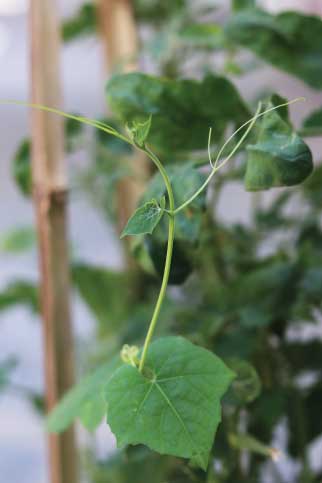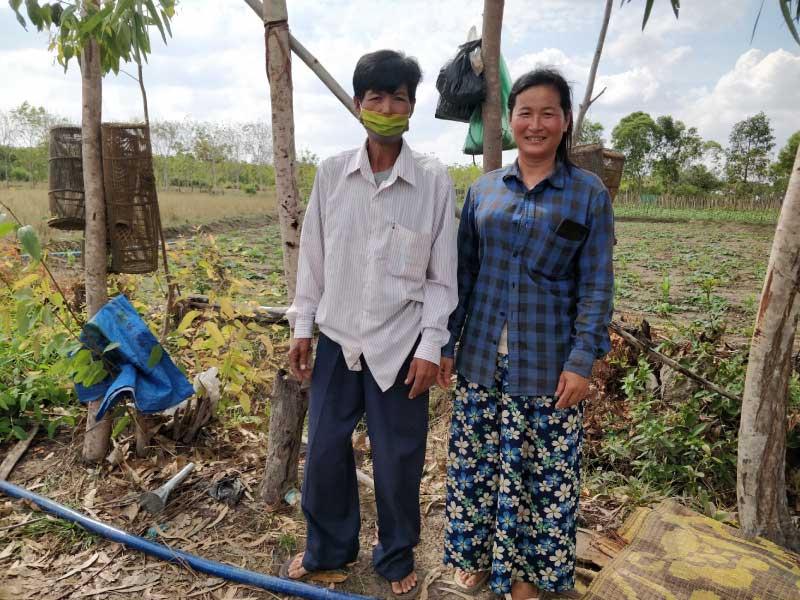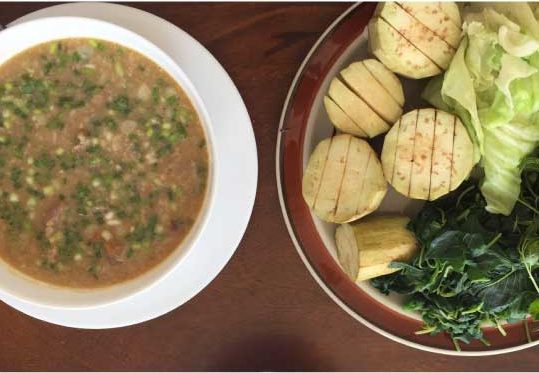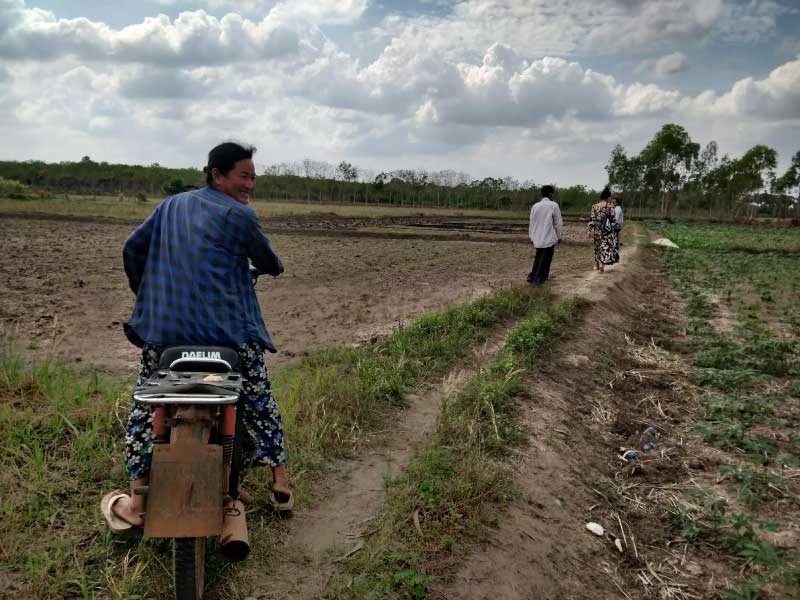
Luffa Shoots
Luffa is a delicious vegetable with many health benefits, including vitamins and fiber, which is beneficial for the digestive system. Luffa. Luffa flowers, fruits, and shoots are all edible; you have them as soup, stir-fried dishes, or a dip with various sauces.

Touch ages around 40 plus and Channa, nearly 40s live together with their 7-year-old daughter in Ta Hiev Kraom village, Koang Kang commune, Ponhea Kraek district, Tbong Khmum province. They both are farmers who grow various types of vegetables. Luffa is one of their main vegetables. In addition to rice farming in the rainy season, they grow luffa on approximately half a hectare of land to collect its shoots for their consumption and sale. They grow this vegetable to collect both its fruits and shoots; but most of the time the latter because it is easier to sell and has a better price. Growing luffa for shoots also takes less effort because they do not need a trellis and the more they pick the more new shoots growing. When they are late to harvest the shoots, the vine grows and bears fruits that they can also sell. Generally, Cambodian people use luffa fruit for cooking and not many people are aware that they can also eat luffa shoots just the same way they can eat pumpkin shoots. However, people in Tbong Khmum province like eating luffa shoots and they cook them creatively.

Now, let’s talk about Mengtry and Ton, two of Toch and Channa’s friends. Mengtry and Ton live in Srorlob village, Tbong Khmum district. In 2020 during a trip they were traveling together on a car back from Phnom Penh, the two friends said that they would love to taste luffa shoots. It is more than a year now that the two people keep thinking about an opportunity to taste this crispy luffa shoot, some could be used as a dip with Toeuk Kroeung sauce (a salty and sour flavor sauce made from boiled fish ground with fermented fish) and some could be stir-fried with oyster sauce. Their plan making those dishes made them swallow their saliva and they burst out laughing happily during the trip. Toch and Channa promised that they would cook luffa shoots for their friends one day when they visit their house.

And then, their dream came true when the two friends visited Toch and Channa during the early dry season with some drizzle in February 2020. The two hosts accompanied the visitors to see their farm and collect luffa shoots for cooking. People from Srorlob village told people in Ta Heav Krom village, “Don’t forget to invite us here again during rice transplant season because we want to help to transplant your rice field and to be together once again. It is so much fun already just to imagine about it.”
The two people are hard-working farmers and they work tirelessly to grow rice and other crops. They do not leave their land uncultivated. There is a variety of vegetables and plants around their house including cassava, bitter gourd, pumpkin, string bean, corn, chili, lemongrass, and a diversity of herbs. Toch and Channa are busy with their rice and vegetable farming. In addition to doing their housework and taking care of their child, they take care of their crops, removing weeds, apply fertilizer, reinforce the roots, and water them every day. From dawn to dusk, this small beautiful family does not rest idly. The wife cooks breakfast while the husband washes clothes and then gets themselves ready to send their child to school.
As farmers, both of them value education and encourage their daughter to study hard because they see that knowledge is the solid foundation for her future. Only at the age of 7, studying in grade 3, Soknea is very brave, understanding, and speaks like an adult. This is so admirable. Yet, this does not just a coincidence because this little family has very warm and caring relationships expressed through the way they communicate and the conduct of their life which is full of love, compassion, nurturing, and caring. They ask questions, explain advised her with patience in their daily life. Her grandparents, relatives, and neighbors also have a very good relationship with each other. They are helpful and kind to each other. These good conducts are a reflection of their high level of responsibilities as parents, family members, and community. And all of these are expressed so well in Soknea.
The pure affection and love between parents and child were evident when Toch got sick and Soknea was always by his side to take care of him, feed him and wipe him with a wet towel to help reduce body temperature. She also supported him while he was trying to sit up to prevent her father from falling. While they were sitting under the shade of a mango tree that stands in front of the house, the visitors asked Soknea, “Why do you put effort to take care of your father?” The little girl responded in a firm tone with simple language:
“I love my father and mother, and I am worried when they are sick. The fact that I took care of my father because it is something a good child should do. My father and mother always educate me to become a good child and a good person. Father and mother always take care, nurture, and love me in sickness and health.”
Time flies and a period of one and a half day has come to an end; they leave behind good memories of warmth and happiness in this little house built directly on the ground. This one meal is so meaningful. The dream to be able to eat luffa shoots became a reality while the other party has fulfilled the promise they made with their friends, and their friendship becomes even stronger. This reminds them of an old saying, “it is better to live in a small house than to have a small heart.” It is good to have a heart full of love, compassion, respect, friendliness, and care as a father, a child, a friend, a relative, and a neighbor. Maintaining this kind heart and a close relationship is comparable to the luffa plant growing on this big farm. Producing new tendrils, young shoots, new branches as well as bearing flowers and fruits that provide a pleasant feeling for everyone.

